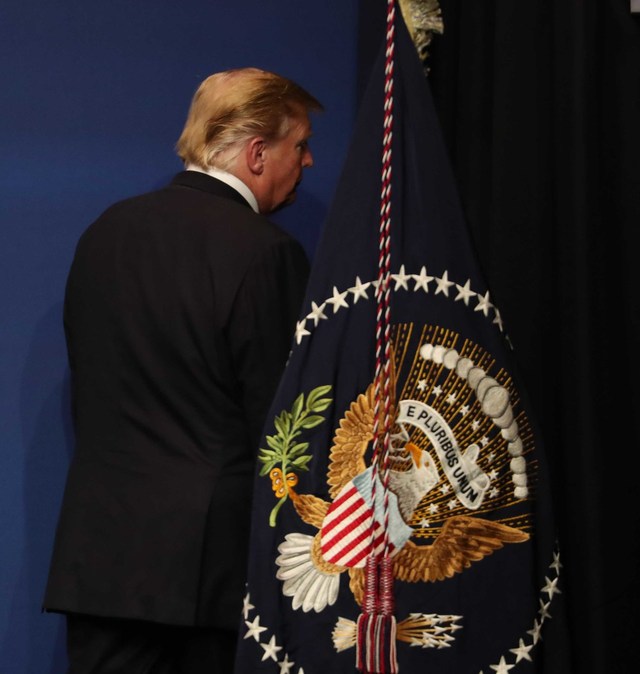Posted on : Mar.1,2019 15:40 KST
 |
|
US President Donald Trump following his post-summit press conference at the JW Marriott Hotel Hanoi on Feb. 28. (Park Jong-shik, staff photographer)
|
The second North Korea-US summit, which took place in Hanoi amid global attention, broke down on Feb. 28 without yielding any results. After appearing headed for success as late as that morning, the summit ran aground during the afternoon. Without an agreement, the North Korean and US leaders canceled their scheduled agreement signing ceremony. The sudden collapse in a summit that was drawing such large attention and interest is deeply shocking.
It is unclear for now who is responsible for the talks falling apart. But it seems unlikely that North Korean leader Kim Jong-un was the first to walk away from the summit, given the “sense of urgency” he described heading into Hanoi. While Trump insisted, “I don’t want to say it was my decision,” it appears that the US’ insistence on its principles put Kim under pressure. Describing the mood as the summit broke down, Trump said, “This wasn’t a walk away, like you get up and walk out. No, this was very friendly. We shook hands.” He suggested the two would meet again. But under the circumstances, it’s impossible to tell when the negotiations might resume.
What does appear clear is that the reason for the negotiations breaking down lay in a failure to coordinate denuclearization actions with corresponding measures. That can be seen in Trump’s remarks, where he mentioned telling Kim that the US could only loosen sanctions if the North provided denuclearization of the kind the US wants. The US appears to have maintained that a dismantlement or freezing of the Yongbyon nuclear facilities was not enough, while Kim pushed strongly for sanctions relief in exchange for Yongbyon’s dismantlement.
The proximate cause for the breakdown looks to have been the two sides’ refusal to back down on these two issues despite their late-stage efforts to find a compromise. This shows that if and when the talks do resume, North Korea and the US will need to discuss matters in far greater depth and make efforts to see things from the other side’s perspective in order to reach an agreement.
Negative attitudes in the US Congress on the North Korea-US summit and progress with denuclearization talks also appear to have had some influence on the collapse. While some signs of a shift in the climate has been in evidence recently, both conservative and progressive politicians in Washington have not been shy about expressing their skepticism toward Trump’s negotiations with North Korea. There has been a growing sense of concern that he might “give too much away” in the talks as a way of extricating himself for a difficult situation politically. Under the circumstances, he faced a no-win situation: criticized for reaching a “small deal” if the negotiations fell short, blasted to making “too many concessions” if he reached a bold compromise. The situation is similar in North Korea, where the leaders would face internal pressure if they proceeded with denuclearization without the sanctions relief that would allow them to achieve economic development. Kim Jong-un may have made a strategic decision to abandon the nuclear program in favor of focusing on the economy, but he is not in a position to readily abandon the nuclear weapons that are so central to his regime’s security.
S. Korea’s proactive role as mediator more urgent than ever
Judging from Trump’s remarks at a press conference following the summit’s collapse, the situation does not appear likely to deteriorate further. Not only did US Secretary of State Mike Pompeo express hopes that an agreement could be reached “in the weeks ahead,” but Trump also indicated his willingness to resume talks, saying he expected an agreement would ultimately be reached. That being said, righting negotiations that have floundered requires a great deal of effort. The situation could take a serious turn for the worse if North Korea and the US start blaming the other side for the breakdown and reinforcing the emotional divide.
The South Korean government, which has long been working to steer North Korea and the US toward an agreement, may have been shocked by this unforeseen outcome – but it cannot afford to simply crumble now. As a mediator and catalyst for the North Korea-US talks, President Moon Jae-in needs to tackle this situation as proactively as possible. The aftereffects of the collapse cannot be allowed to drag out. Obviously, it is deeply disappointing – but the summit breakdown does not spell a breakdown for negotiations in general. Last year, the South Korean government rescued the Singapore summit from being canceled just before it was set to take place. It needs to draw on that experience now and make every effort to get the negotiations back on track.
Please direct comments or questions to [english@hani.co.kr]






